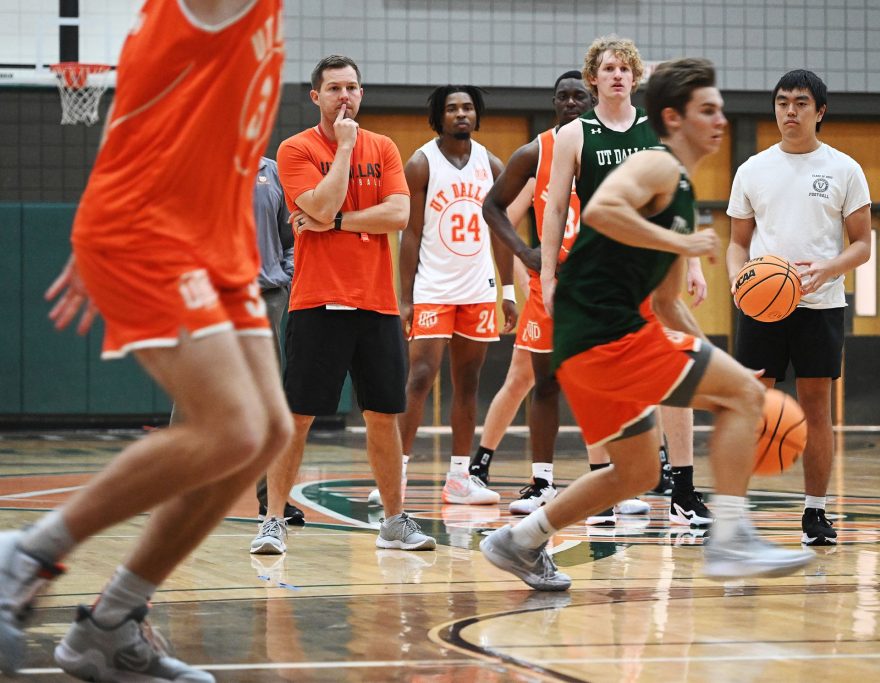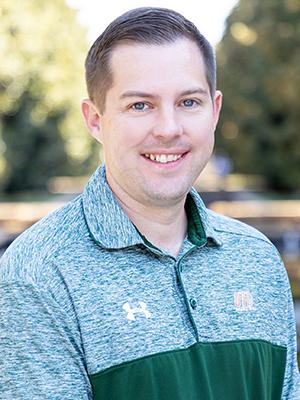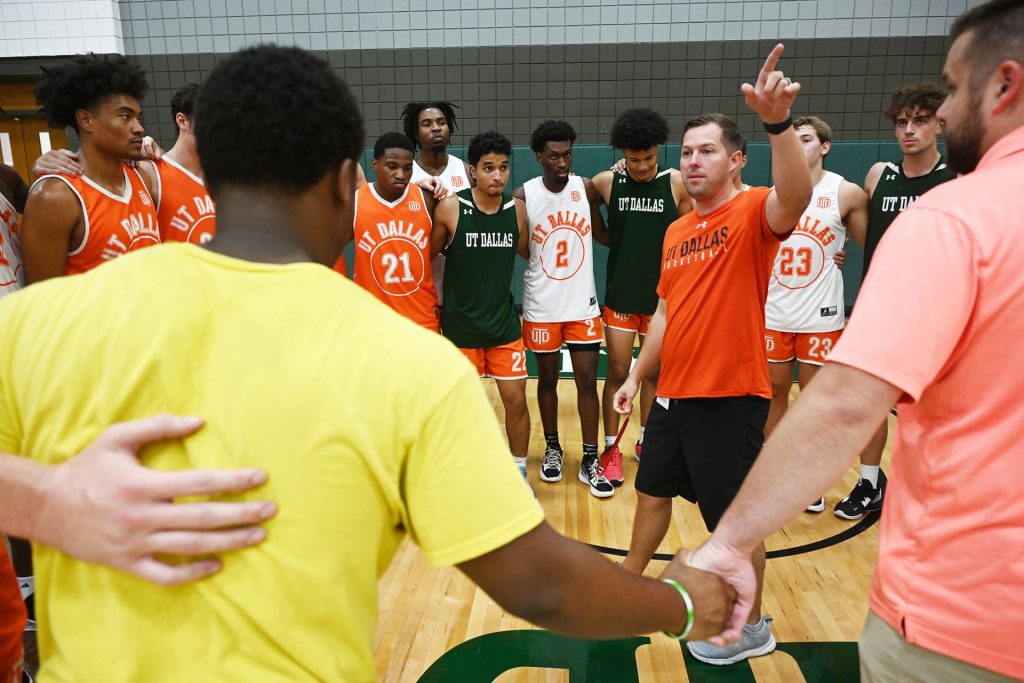Former Comets Coach, Player Returns to Lead Basketball Team
By: Jeff Joiner | November 13, 2023

UT Dallas men’s head basketball coach Jared Fleming BS’09, MS’10 stands on the court and yells instructions to his players as they run practice drills in preparation for the upcoming Comets basketball season. Standing 5 feet, 10 inches, Fleming is a full foot shorter than some of his players, but he still commands their attention.
Fleming, who returned to the program in July, is no stranger to UT Dallas basketball. With more than 12 years as both a standout player and an assistant coach, he has laid a firm foundation for taking over the program. It’s also an auspicious time for the team. All UTD varsity sports teams are joining the Lone Star Conference in fall 2025 and applying to join NCAA’s Division II in February 2024 after playing in Division III since 1998. As only UTD’s third head men’s basketball coach, Fleming is set to remake his team as it prepares to transition to the new division. The biggest change will be the ability to offer scholarships.
“Obviously, with scholarships this will open up doors that we would not have otherwise to recruit a-little-bit-bigger kids,” Fleming said. “But you still have to score; you still have to defend and rebound. It will just involve a little more size and physicality. It will be challenging, but we’re excited.”

Fleming was a point guard from 2006 to 2010 while also earning a bachelor’s degree in finance from the Naveen Jindal School of Management. He then earned a master’s in finance while working as a graduate assistant for head basketball coach Terry Butterfield, who retired this year after 23 seasons at UTD.
Fleming played on Comets teams that made it to the NCAA Division III tournament’s Elite 8 in 2009 and the Sweet 16 the next year. As an assistant coach, Fleming helped lead the Comets to a 2019 American Southwest Conference championship and two trips to the NCAA tournament.
“When you get to that point and you’re playing against the best teams in the country, you realize your team deserves to be there,” Fleming said. “Honestly, to compete at that level makes you hungry for more.”
Raised in the east Texas town of Hawkins where his dad, David Fleming, was the high school football coach and assistant basketball coach, Fleming said he grew up on the sidelines of football games and hung out with his dad while he watched scouting films and put together game plans. And he played basketball for this dad.
“Being around him as a coach as I grew up and then playing for him was a large influence on me becoming a coach,” Fleming said. “Being able to watch him coach and play for him was a special experience.”
Fleming was recruited by Butterfield at UT Dallas, playing point guard as a starter and off the bench. As a finance major, Fleming was recognized with all-conference academic honors his junior and senior years. He said he studied finance because, at the time, he was interested in working in the business of sports and hoped to one day become a sports team general manager. After graduating with his master’s in 2010, he went to work for the Shreveport Captains minor league baseball team as director of ticket operations. But working in the front office left him wanting more.
“I realized that I missed the emotional investment in what was happening on the field,” Fleming said. “Working in the front office, I couldn’t even watch games. You’re too busy. It’s like, ‘Oh, did we win?’ I decided I didn’t want to sit in an office.”
Fleming’s first coaching job was at Franklin College in Indiana, where he was an assistant for three years. He returned to Texas in 2014 as an assistant coach at Schreiner University in Kerrville. An opportunity to return to UT Dallas opened up when assistant coach Travis Carruthers BS’07 joined Howard Payne University in 2015
“Coach Butterfield called me and told me it was time for me to come home,” Fleming said.
Fleming calls Butterfield, who won 553 games overall in his coaching career, his most influential mentor next to his dad.
“He has given me so much good advice over the eight years I worked for him,” Fleming said. “He told me that coaching is all about people and that great coaches can elevate teams and bad coaches bring them down. But at the end of the day, it’s all about having good people in your program who are committed to what you’re doing.”
Recruiting talented athletes who can succeed at an academically challenging university is a top priority for Fleming, who calls recruiting the lifeblood of a program. But attracting student-athletes to play for UTD is not a huge challenge despite the current lack of athletic scholarships for NCAA Division III schools. Fleming sells the University and its reputation when talking to high school players and their families.

“We have a great athletic program with a proud tradition of success,” Fleming said. “Our kids are high-level athletes, and they’re also high-level students. Last year, our four seniors majored in mechanical engineering, computer science, math and business analytics. Our guys play and excel in the classroom, and that’s unique among most colleges. It’s special.”
The Comets will spend this season as a Division III team and begin the transition to Division II next season. With approval of the elevation to Division II, the program will begin offering athletic scholarships to its players. Recruiting will change with the impact of money and competing as a member of the Lone Star Conference in Division II. But, Fleming said, “Basketball is basketball.”
“We tell kids that basketball is one thing, but at the end of day if you’re coming here to just play basketball, we’re not the right place for you,” Fleming said. “You need to come here knowing that you’re going to get an unbelievable education that’s going to open doors for you for the rest of your life. And at the same time, you get to play basketball.”